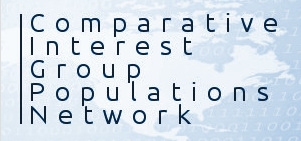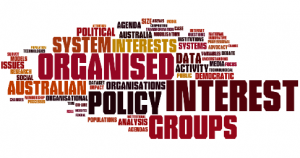
The main purpose of INTEREURO is to get a more comprehensive theoretical and empirical understanding of the role that interest groups play in the European polity. The project involved a detailed study of 135 legislative processes, the mapping of the EU’s interest group population as well as the systematic interviewing of organized interests and policymakers.

The Comparative Interest Group Populations Network brings together scholars collecting data about interest group populations in a wide variety of countries and at international organizations such as the European Union or the World Trade Organization. The Comparative Interest Group Populations Network therefore aims to overcome this shortcoming by bringing together recent and ongoing research projects that collected data on interest group populations in different arenas to provide interested scholars with an overview of existing data sources and research designs and to eventually make the collected data accessible to the wider research community.

This research project was a major, multi-year academic study of the process of lobbying and policymaking in Washington, DC. The project was funded by the National Science Foundation (grants #SBR-9905195 for the period of 1999 and 2000 and #SES-0111224 for the period of 2001 to 2003), with significant support from Penn State University. The project is conducted at the Department of Political Science, Aarhus University in a four-year period from January 1st 2011 to December 31th 2014. In this period empirical investigations will be carried out in Denmark, Great Britain and Germany. The project has received a Sapere Aude grant from the Danish Council for Independent Research. INTERARENA analyzes group influence towards the bureaucracy, parliament and the media. Among other things the project seeks to establish which groups are successful in attracting the attention of the media or bureaucrats and thus affecting political and administrative decisions.

Interest groups have been transforming themselves in response to changes in the political landscape and the advent of the internet and its associated communication technologies. The project “The Organised Interest System in Australian Public Policy” assesses these developments through exploring the size and composition of the Australian system of organised interests, examining how these groups are organized and set their policy agenda, and analysing whose interests are most prominent in the policy process. The project [DP140104097] was funded by the Australian Research Council (ARC) Discovery scheme.
The research project “Spanish Policy Agendas Project” is aimed to analyze the interrelation between governmental, parliamentary and media agendas across time, issues, countries and levels of government. The project establishes a link between agenda dynamics research and other areas of concern in political science, especially interest groups, media studies, political representation, and the quality of democracy in multilevel systems of governance. The project is part of the Comparative Agendas project and provides new tools for the development of quantitative measurement of policy dynamics. Regarding interest groups, the project has developed a novel and comprehensive database about interest groups mobilization in Spain. For more information see www.ub.edu/spanishpolicyagendas
EUROLOB II investigates how national and European business interest associations (BIAs) and companies respond to changed conditions of interest intermediation caused by institutional reforms, new consultation procedures and reduced “ear-time” due to enlargement and increased activities of European NGOs. The research is based on the replication of an earlier survey (EUROLOB I, 1999), addressed to BIAs and companies in Germany, Great Britain, France and the EU. For comparative reasons it is extended to Poland and to European NGOs. The quantitative analysis will be supplemented with a series of interviews.